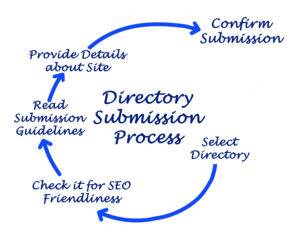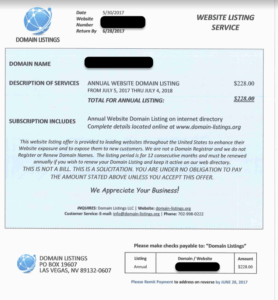Top 10 Digital Marketing Scams Targeting Your Small Business
By Lauretta Shokler | Published July 3, 2017
Business scams have existed for thousands of years. From the drowning of the ancient Greek Hegestratos to the modern day Bernie Madoff, caveat emptor (or buyer beware) has been solid advice for centuries. The same applies to the online world as well. Small businesses in particular seem to be easy victims of these new digital scams, so if you are a small business owner who wants to avoid being caught in these webs, read more about these 10 digital marketing scams.
1. Google Business Listing Scams – If you are a small business owner, you have probably received this call. Someone, claiming to be from Google, sends an unsolicited email or calls you claiming that you have a problem with your Google Business Listing. To be sure, Google Business Listings are a challenge for some businesses, but unless you are spending a lot of money on Google Adwords, Google is not going to be calling you about your Google Business Listing. Google My Business (GMB) is a free service, and anyone who has called for help with their business listing knows Google doesn’t have the time or resources to dedicate to making proactive calls.
Google Business Listing Scams – If you are a small business owner, you have probably received this call. Someone, claiming to be from Google, sends an unsolicited email or calls you claiming that you have a problem with your Google Business Listing. To be sure, Google Business Listings are a challenge for some businesses, but unless you are spending a lot of money on Google Adwords, Google is not going to be calling you about your Google Business Listing. Google My Business (GMB) is a free service, and anyone who has called for help with their business listing knows Google doesn’t have the time or resources to dedicate to making proactive calls.
These calls are coming from unscrupulous players in the digital marketing vertical who play on your fears. With all the hand-to-hand combat that goes on at the local level with these listing (because they are so valuable), it’s not surprising that many business owners are lured in by their claims. Often, however, these are the very same people who are stealing or incorrectly updating other business’ listings for their own clients’ gain. Unless it’s about your Adwords account or you are expecting a call from them for something specific, Google is not likely to be calling your business, so just hang up the phone, check on your Google listing by searching your company name and city here http://maps.google.com. If the information you see is correct, no further action is needed. Want to know more? Learn more about it from Google itself.
2. Useless Online Directory Listings – Online directory submission is a controversial topic, but it doesn’t have to be. Websites absolutely should find and submit their business to high-quality, valuable directories. Yelp is a go-to for customer reviews.  Angie’s List, Houzz and HomeAdvisor are great places to be listed if you offer home repair and decorating services. If you are a law firm, you will want to be listed on findlaw, Avvo and lawyers.com to name a few. These directories offer businesses a great way to be found online, to be compared to competitors, and to gain backlinks for their websites.
Angie’s List, Houzz and HomeAdvisor are great places to be listed if you offer home repair and decorating services. If you are a law firm, you will want to be listed on findlaw, Avvo and lawyers.com to name a few. These directories offer businesses a great way to be found online, to be compared to competitors, and to gain backlinks for their websites.
The problem with online directories arises when agencies and SEO professionals start promoting services to submit your business to hundreds, even thousands of low-quality, useless directories. Before agreeing to that, keep in mind that directory submissions can be helpful if done properly, but they are not a cure-all for SEO, and may do more harm than good.
3. Digital Marketing Agencies with Deceptive Client Lists – This problem is difficult to sleuth out and isn’t likely to be as harmful as some of the others on the list, but it’s something businesses should know about when vetting digital marketing professionals and agencies. Some companies and professionals inflate their client lists and vendor partners to make them look more experienced and skilled than they really are. For example, if an agency gets a small contract from a division or a subsidiary of a much bigger corporation, then they may claim that larger corporation as their client.

This tactic is designed to instill more trust in that agency or professional, making clients think they have more experience than they actually do. It’s up to the potential client to actually do their homework and fully vet those claims. Be sure to ask about the projects they worked on and specifically about any big name clients they list on their website. Find out who worked on the project and whether that person is still with the agency, and what exactly the scope of the project was if possible. This will help you determine how much their “impressive” client and vendor list should factor into your decision. A better measure of a good fit would be to find an agency or professional who is familiar with your vertical, website CMS, and the type of marketing you are wanting to do.
4. Hacked, Spammy or Technically Broken Sites – Emails or calls from “digital marketing professionals” who say your website is broken, has been hacked or contains spam are a red flag. While most websites do have errors that can be fixed, the true impact of the problem may not justify the cost of the correction.  Furthermore, these so-called “experts” are not going to have direct insight as to why, say, a specific canonical tag was set up a certain way, or why the page has a no-follow tag. Sometimes deliberate technical adaptations on websites that would normally fall under the standard list of errors, is correct. This is what makes reliance on tools sometimes very challenging as well. Untrained hucksters who use these inflexible tools are just looking to make a quick dollar, and they can’t account for exceptions. They will also have trouble providing an accurate estimate of the value their recommended corrections could provide. If you get a call like this, don’t give over access to your website, email, accounts or computers. Instead, research the errors they claim are the problem or hire a reputable website development firm to do a full audit if you are concerned. Learn more about these types of scams and how to avoid them.
Furthermore, these so-called “experts” are not going to have direct insight as to why, say, a specific canonical tag was set up a certain way, or why the page has a no-follow tag. Sometimes deliberate technical adaptations on websites that would normally fall under the standard list of errors, is correct. This is what makes reliance on tools sometimes very challenging as well. Untrained hucksters who use these inflexible tools are just looking to make a quick dollar, and they can’t account for exceptions. They will also have trouble providing an accurate estimate of the value their recommended corrections could provide. If you get a call like this, don’t give over access to your website, email, accounts or computers. Instead, research the errors they claim are the problem or hire a reputable website development firm to do a full audit if you are concerned. Learn more about these types of scams and how to avoid them.
5. Digital Marketing Services Priced Too Good to be True  – If your small business is in the market for digital marketing services, approach your vetting process with care. Many questionable players will contact you and make a lot of tempting claims. Even ones you seek out can have unseen weaknesses that might not be evident during the sales courting process. Having a digital marketing partner you can work with is a critical part of any business’s marketing strategy, so look for the following red flags when considering an agency or digital professional:
– If your small business is in the market for digital marketing services, approach your vetting process with care. Many questionable players will contact you and make a lot of tempting claims. Even ones you seek out can have unseen weaknesses that might not be evident during the sales courting process. Having a digital marketing partner you can work with is a critical part of any business’s marketing strategy, so look for the following red flags when considering an agency or digital professional:
- Low-quality providers quoting very cheap prices for templated services are not a good idea. The reality is that quality, custom digital marketing that is actually going to make a difference for your business is labor intensive. It requires research, strategy development, tactical timelines, data tracking, results measurement and an iterative adaptive approach that can take months and years.
- Agencies that claim to provide a quality product at a cheap price need to be questioned. You don’t want to overpay for a service. However, if a provider is quoting a price much lower than the other companies you are vetting, find out why. Some may outsource all their work to low-wage workers (see scam #9 below), some have a reputation for taking payment but not actually doing all or some of the work, and some are simply too inexperienced to know how to properly price their services. This problem is especially common with independent contractors and sole proprietors.
- Verify the scope of the project. Many agencies use the same or similar names for very different services. Sadly, the industry is devoid of standards. Ask for what specifically is included and not included in the service they are proposing. Also, ask why you need this service and how it will benefit your business. Ask them to define the data they will use to track the impact. Remember, a service that doesn’t benefit your business is still a waste of money even if it is super cheap.
6. Guarantees to Rank #1 on Google – Just walk away. Seriously, just walk away from anyone claiming this or that they know the Google algorithm and can hack it. No one fully knows the Google algorithm, if for no other reason than a big ranking factor is determined by machine learning that happens all the time, so it’s constantly changing at the hands of machines now! One of three possible results will come from engaging the services of someone making this promise:
- You will get a #1 Google Ranking but for keywords almost no one searches and won’t make a difference.
- You will find yourself on an endless spending spree chasing rankings owned by companies with much deeper pockets.
- You will get a long line of excuses as to why it didn’t happen and never get any results for your money.
Google themselves even warn against these claims in one of their top support pages:
“No one can guarantee a #1 ranking on Google. Beware of SEOs that claim to guarantee rankings, allege a “special relationship” with Google, or advertise a “priority submit” to Google. There is no priority submit for Google. In fact, the only way to submit a site to Google directly is through our Add URL page or by submitting a Sitemap and you can do this yourself at no cost whatsoever.”
 7. Buying Email Lists, Facebook Followers, etc. – While some lists are legitimate, be sure to fully vet what you are buying, especially social followers. Email lists can be filled with spamtrap email addresses that are designed to identify spammers and shut down their email marketing. Also, when you buy an email list, you have not earned the right to know these people’s contact information, so response rates may be low, opt-outs may be high and you run the risk of being reported as spam. Purchased lists may be a violation of your email service providers terms of service as well. Even social channels are making an effort to crack down on fake profiles, which these lists are often filled with. One other thought on purchased lists: this tactic is so easy anyone can do it. So think about that. If anyone can do it, how much of a competitive advantage could this tactic really be?
7. Buying Email Lists, Facebook Followers, etc. – While some lists are legitimate, be sure to fully vet what you are buying, especially social followers. Email lists can be filled with spamtrap email addresses that are designed to identify spammers and shut down their email marketing. Also, when you buy an email list, you have not earned the right to know these people’s contact information, so response rates may be low, opt-outs may be high and you run the risk of being reported as spam. Purchased lists may be a violation of your email service providers terms of service as well. Even social channels are making an effort to crack down on fake profiles, which these lists are often filled with. One other thought on purchased lists: this tactic is so easy anyone can do it. So think about that. If anyone can do it, how much of a competitive advantage could this tactic really be?
8. Back Linking Schemes – Google defines a link scheme as, “Any links intended to manipulate PageRank or a site’s ranking in Google search results may be considered part of a link scheme and a violation of Google’s Webmaster Guidelines.” Many inexperienced or aggressive risk-taking SEOs will recommend and/or execute questionable linking efforts for businesses.  Links are still part of the search engine algorithms, so they can be valuable parts of an SEO strategy, but, aggressive linking can cause more harm than good. Almost every reputable digital marketer can recant stories of clean-up jobs for clients who had previously worked with unscrupulous SEOs who built spammy link profiles that have hurt the client’s website SEO performance. High quality, relevant links are complex and difficult to obtain, so be sure to ask an SEO you are considering hiring about their linking process if it will be part of your services. This article on link building from Search Engine Journal is a great starting point for that conversation.
Links are still part of the search engine algorithms, so they can be valuable parts of an SEO strategy, but, aggressive linking can cause more harm than good. Almost every reputable digital marketer can recant stories of clean-up jobs for clients who had previously worked with unscrupulous SEOs who built spammy link profiles that have hurt the client’s website SEO performance. High quality, relevant links are complex and difficult to obtain, so be sure to ask an SEO you are considering hiring about their linking process if it will be part of your services. This article on link building from Search Engine Journal is a great starting point for that conversation.
9. Outsourcing Digital Marketing Services –  Let’s start by stating upfront that outsourcing as a general practice isn’t inherently bad. Like most business strategies, the level of success achieved with outsourcing is contingent on how it’s implemented. For this article, we are talking about the full outsourcing of most or all of the digital marketing work including paying low-wage workers to execute spammy, black-hat and low-value tactics like mass link building, content spinning and junk press releases. Aside from the obvious challenges of language barriers and time zone/accessibility issues, the biggest issue with this structure is the poor quality of the work being done by inexperienced and unqualified contractors. You may be assigned an account or project manager locally, but this individual is unlikely to look at your marketing strategically, and instead focus on a bank of tactical services they can sell you. Typically agencies with a project manager and outsourced execution structure are focused on short-term relationships, selling finite projects and completion of work quickly and at a low price. This approach limits expectations of providing any real long-term value to clients. Learn more about vetting a potential digital marketing agency.
Let’s start by stating upfront that outsourcing as a general practice isn’t inherently bad. Like most business strategies, the level of success achieved with outsourcing is contingent on how it’s implemented. For this article, we are talking about the full outsourcing of most or all of the digital marketing work including paying low-wage workers to execute spammy, black-hat and low-value tactics like mass link building, content spinning and junk press releases. Aside from the obvious challenges of language barriers and time zone/accessibility issues, the biggest issue with this structure is the poor quality of the work being done by inexperienced and unqualified contractors. You may be assigned an account or project manager locally, but this individual is unlikely to look at your marketing strategically, and instead focus on a bank of tactical services they can sell you. Typically agencies with a project manager and outsourced execution structure are focused on short-term relationships, selling finite projects and completion of work quickly and at a low price. This approach limits expectations of providing any real long-term value to clients. Learn more about vetting a potential digital marketing agency.
10. Fake Website Domain Expirations/Takeovers – Domain names are valuable assets, so many companies use them to try to scam small businesses. The most important step you can take to prevent website domain name scams is to know who hosts your site domain and when it expires. Some scammers will contact you saying that someone is trying to register a series of domain name based on your brand or existing domain. Here is an example of one of those emails:
(If you are not the person who is in charge of this, please forward to the right person/ department, as this is urgent, thank you.)
Dear CEO,
We are the department of registration service in China. We have something need to confirm with you. We formally received an application on April 5, 2016, One company which is called “XYZ Trading Co. Ltd” is applying to register [your-website-name] as brand name and domain names as below:
[your-website-name] .asia
[your-website-name] .cn
[your-website-name] .com.cn
[your-website-name] .com.hk
[your-website-name] .com.tw
[your-website-name] .hk
[your-website-name] .in
[your-website-name] .net.cn
[your-website-name] .org.cn
[your-website-name] .tw
After our initial checking, we found the brand name and these domain names being applied are as same as your company’s, so we need to confirm with your company. If the aforesaid company is your business partner or your subsidiary company, please DO NOT reply us, we will approve the application automatically.
If you have no any relationship with this company, please contact us within 7 workdays. If out of the deadline, we will approve the application submitted by “XYZ Trading Co. Ltd” unconditionally.
Best Regards,
John Hancock
Senior Consultant
Domains can be taken from you, but only if you release them, let them expire, choose to sell them or lose control of the domain in a lawsuit. An unexpired active domain name cannot just be released to someone else. Do be aware that sometimes other businesses will try to capitalize on your brand by buying the similar domain names. For example, if your domain is “my-website.com” they may register “my-website.info” or a domain with a slight misspelling. This is a legitimate but iffy practice, and you are unlikely to be notified of such a purchase. For that reason, some businesses buy multiple website domains to prevent this from happening.
Others scams involve attempts to get you to move your domain hosting to their company by sending out a fake invoice related to your business’ website domain. A recent one received by one of our clients is shown below.

Remember that renewing your website domain name is important; however, the company where you registered your domain should notify you or auto-renew your domain name prior to it expiring, so focus on those communications related to managing your website domain.
Steps to Avoid and Report Digital Scams
Casting doubt on the validity, effectiveness, and security of a small business’ online assets often triggers concern in small business owners. Scammers love to take advantage of people’s unfamiliarity with technology, so online scams can be particularly effective. Don’t become a victim of these predatory schemes. One way to inoculate yourself is to subscribe to some of the industry blogs like Moz, Kissmetrics, Marketing Land, or Social Media Examiner. These blogs often report on digital scams when they are happening. Another way is to contact your digital marketing agency, if you use one, and ask them. They see these scams frequently and can spot the patterns quickly. Websites like Snopes and Fraud.org can also be helpful for researching scams. Finally, if you want to report a scam, you do so through the FBI and Internet Crime Complaint Center here.
If you are interested in partnering with an agency that believes in building client trust and not only knows the tools of the trade but is also watching out for your online presence, then contact the experts at Osky Blue. We understand digital marketing. Contact us at (866) 675-9411.


 Google Business Listing Scams – If you are a small business owner, you have probably received this call. Someone, claiming to be from Google, sends an unsolicited email or calls you claiming that you have a problem with your Google Business Listing. To be sure, Google Business Listings are a challenge for some businesses, but unless you are spending a lot of money on Google Adwords, Google is not going to be calling you about your Google Business Listing. Google My Business (GMB) is a free service, and anyone who has called for help with their business listing knows Google doesn’t have the time or resources to dedicate to making proactive calls.
Google Business Listing Scams – If you are a small business owner, you have probably received this call. Someone, claiming to be from Google, sends an unsolicited email or calls you claiming that you have a problem with your Google Business Listing. To be sure, Google Business Listings are a challenge for some businesses, but unless you are spending a lot of money on Google Adwords, Google is not going to be calling you about your Google Business Listing. Google My Business (GMB) is a free service, and anyone who has called for help with their business listing knows Google doesn’t have the time or resources to dedicate to making proactive calls. Angie’s List, Houzz and HomeAdvisor are great places to be listed if you offer home repair and decorating services. If you are a law firm, you will want to be listed on findlaw, Avvo and lawyers.com to name a few. These directories offer businesses a great way to be found online, to be compared to competitors, and to gain backlinks for their websites.
Angie’s List, Houzz and HomeAdvisor are great places to be listed if you offer home repair and decorating services. If you are a law firm, you will want to be listed on findlaw, Avvo and lawyers.com to name a few. These directories offer businesses a great way to be found online, to be compared to competitors, and to gain backlinks for their websites.
 Furthermore, these so-called “experts” are not going to have direct insight as to why, say, a specific canonical tag was set up a certain way, or why the page has a no-follow tag. Sometimes deliberate technical adaptations on websites that would normally fall under the standard list of errors, is correct. This is what makes reliance on tools sometimes very challenging as well. Untrained hucksters who use these inflexible tools are just looking to make a quick dollar, and they can’t account for exceptions. They will also have trouble providing an accurate estimate of the value their recommended corrections could provide. If you get a call like this, don’t give over access to your website, email, accounts or computers. Instead, research the errors they claim are the problem or hire a reputable website development firm to do a full audit if you are concerned.
Furthermore, these so-called “experts” are not going to have direct insight as to why, say, a specific canonical tag was set up a certain way, or why the page has a no-follow tag. Sometimes deliberate technical adaptations on websites that would normally fall under the standard list of errors, is correct. This is what makes reliance on tools sometimes very challenging as well. Untrained hucksters who use these inflexible tools are just looking to make a quick dollar, and they can’t account for exceptions. They will also have trouble providing an accurate estimate of the value their recommended corrections could provide. If you get a call like this, don’t give over access to your website, email, accounts or computers. Instead, research the errors they claim are the problem or hire a reputable website development firm to do a full audit if you are concerned.  – If your small business is in the market for digital marketing services, approach your vetting process with care. Many questionable players will contact you and make a lot of tempting claims. Even ones you seek out can have unseen weaknesses that might not be evident during the sales courting process. Having a digital marketing partner you can work with is a critical part of any business’s marketing strategy, so look for the following red flags when considering an agency or digital professional:
– If your small business is in the market for digital marketing services, approach your vetting process with care. Many questionable players will contact you and make a lot of tempting claims. Even ones you seek out can have unseen weaknesses that might not be evident during the sales courting process. Having a digital marketing partner you can work with is a critical part of any business’s marketing strategy, so look for the following red flags when considering an agency or digital professional:
 7. Buying Email Lists, Facebook Followers, etc. – While some lists are legitimate, be sure to fully vet what you are buying, especially social followers. Email lists can be filled with
7. Buying Email Lists, Facebook Followers, etc. – While some lists are legitimate, be sure to fully vet what you are buying, especially social followers. Email lists can be filled with  Links are still part of the search engine algorithms, so they can be valuable parts of an SEO strategy, but,
Links are still part of the search engine algorithms, so they can be valuable parts of an SEO strategy, but,  Let’s start by stating upfront that outsourcing as a general practice isn’t inherently bad. Like most business strategies, the level of success achieved with outsourcing is contingent on how it’s implemented. For this article, we are talking about the full outsourcing of most or all of the digital marketing work including paying low-wage workers to execute spammy, black-hat and low-value tactics like mass link building, content spinning and junk press releases. Aside from the obvious challenges of language barriers and time zone/accessibility issues, the biggest issue with this structure is the poor quality of the work being done by inexperienced and unqualified contractors. You may be assigned an account or project manager locally, but this individual is unlikely to look at your marketing strategically, and instead focus on a bank of tactical services they can sell you. Typically agencies with a project manager and outsourced execution structure are focused on short-term relationships, selling finite projects and completion of work quickly and at a low price. This approach limits expectations of providing any real long-term value to clients.
Let’s start by stating upfront that outsourcing as a general practice isn’t inherently bad. Like most business strategies, the level of success achieved with outsourcing is contingent on how it’s implemented. For this article, we are talking about the full outsourcing of most or all of the digital marketing work including paying low-wage workers to execute spammy, black-hat and low-value tactics like mass link building, content spinning and junk press releases. Aside from the obvious challenges of language barriers and time zone/accessibility issues, the biggest issue with this structure is the poor quality of the work being done by inexperienced and unqualified contractors. You may be assigned an account or project manager locally, but this individual is unlikely to look at your marketing strategically, and instead focus on a bank of tactical services they can sell you. Typically agencies with a project manager and outsourced execution structure are focused on short-term relationships, selling finite projects and completion of work quickly and at a low price. This approach limits expectations of providing any real long-term value to clients. 